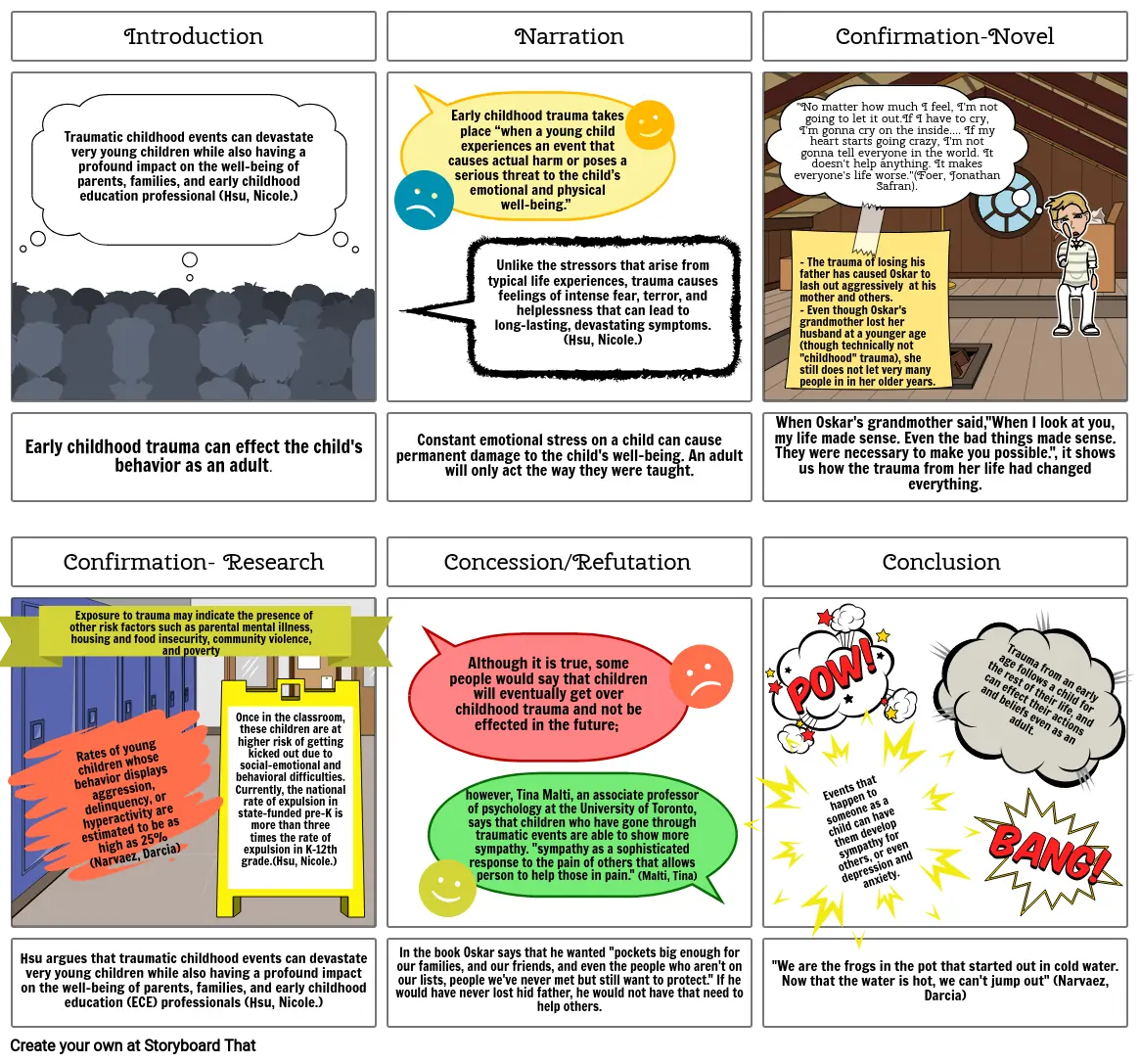Child Behavior in Extremely Loud and Incredibly Close

Siužetinės Linijos Aprašymas
Briley Smith 5th
Siužetinės Linijos Tekstas
- Introduction
- Traumatic childhood events can devastate very young children while also having a profound impact on the well-being of parents, families, and early childhood education professional (Hsu, Nicole.)
- Narration
- Unlike the stressors that arise from typical life experiences, trauma causes feelings of intense fear, terror, and helplessness that can lead to long-lasting, devastating symptoms. (Hsu, Nicole.)
- Early childhood trauma takes place “when a young child experiences an event that causes actual harm or poses a serious threat to the child’s emotional and physical well-being.”
- Confirmation-Novel
- "No matter how much I feel, I'm not going to let it out.If I have to cry, I'm gonna cry on the inside.... If my heart starts going crazy, I'm not gonna tell everyone in the world. It doesn't help anything. It makes everyone's life worse."(Foer, Jonathan Safran).
- - The trauma of losing his father has caused Oskar to lash out aggressively at his mother and others. - Even though Oskar's grandmother lost her husband at a younger age (though technically not "childhood" trauma), she still does not let very many people in in her older years.
- Exposure to trauma may indicate the presence of other risk factors such as parental mental illness, housing and food insecurity, community violence, and poverty
- Early childhood trauma can effect the child's behavior as an adult.
- Confirmation- Research
- Once in the classroom, these children are at higher risk of getting kicked out due to social-emotional and behavioral difficulties. Currently, the national rate of expulsion in state-funded pre-K is more than three times the rate of expulsion in K-12th grade.(Hsu, Nicole.)
- Constant emotional stress on a child can cause permanent damage to the child's well-being. An adult will only act the way they were taught.
- Concession/Refutation
- Although it is true, some people would say that children will eventually get over childhood trauma and not be effected in the future;
- When Oskar's grandmother said,"When I look at you, my life made sense. Even the bad things made sense. They were necessary to make you possible.", it shows us how the trauma from her life had changed everything.
- Conclusion
- Trauma from an early age follows a child for the rest of their life, and can effect their actions and beliefs even as an adult.
- Hsu argues that traumatic childhood events can devastate very young children while also having a profound impact on the well-being of parents, families, and early childhood education (ECE) professionals (Hsu, Nicole.)
- Rates of young children whose behavior displays aggression, delinquency, or hyperactivity are estimated to be as high as 25% (Narvaez, Darcia)
- In the book Oskar says that he wanted "pockets big enough for our families, and our friends, and even the people who aren't on our lists, people we've never met but still want to protect." If he would have never lost hid father, he would not have that need to help others.
- however, Tina Malti, an associate professor of psychology at the University of Toronto, says that children who have gone through traumatic events are able to show more sympathy. "sympathy as a sophisticated response to the pain of others that allows a person to help those in pain." (Malti, Tina)
- Events that happen to someone as a child can have them develop sympathy for others, or even depression and anxiety.
- "We are the frogs in the pot that started out in cold water. Now that the water is hot, we can't jump out" (Narvaez, Darcia)
Sukurta daugiau nei 30 milijonų siužetinių lentelių

